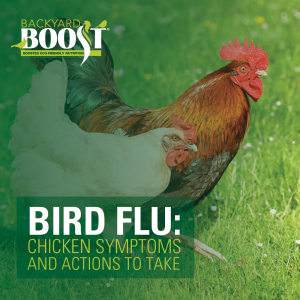
Your backyard feathered friends are here for a reason. You enjoy their companionship. They are entertaining, fun to watch, and even relieve stress at the end of a long day. Those chickens become part of the family, just like any animal does.
However, chickens in the backyard lend themselves to becoming prey. As hen-enthusiasts ourselves, our Backyard Boost® Team understands that, and we don’t like it one bit. We have our own backyard birds and are rather fond of them. That is why we wanted to share what we’ve learned about how to protect chickens from predators.
Chicken predators come in all shapes and sizes – both wild and domesticated. They can be wild animals and birds like foxes, coyotes, raccoons, hawks, and owls. Or they can be your own dogs and cats. They might even be other humans.
How to Protect Chickens from Predators
Protecting your chickens from predators takes a proactive approach. It requires a combination of secure housing and watchful management practices. We offer 5 tips to protect your feathered friends and keep them safe.
1. Secure the Coop & Run
The first step in protecting chickens from predators is having a secure coop where you house them at night, when many predators lurk. You will also want a fenced-in run to let your chickens exercise in during the day. Many people let their chickens run “free-range,” but this lends itself to predator challenges.
Strong Construction
Build or reinforce your coop and run with sturdy materials. Use wood, metal or other solid materials that cannot be easily chewed through.
Hardware Cloth
For windows, vents, and any openings, use 1/2-inch hardware cloth instead of chicken wire. Hardware cloth is more durable and resistant to predators like raccoons and weasels.
Elevate the Coop
Raise the coop off the ground to prevent burrowing predators from digging underneath.
Lock the Coop at Night
Ensure the coop is securely locked at night with predator-proof latches that raccoons cannot manipulate.
Bury the Fencing
When building your runs, bury the fencing at least 12 inches underground. To prevent digging predators, you can also create an apron of hardware cloth extending outward from the base of the fence.
Roof the Run
We also suggest covering your run with hardware cloth or netting to protect against aerial predators like hawks and owls.
Regular Inspections
Finally, when it comes to your coop and run, check regularly for holes, gaps or weaknesses and repair them immediately.
2. Use Predator Deterrents & Motion-Activated Lights
Depending on where you live, predators can be warded off from your coop or backyard fairly easily. Use these controls to protect chickens from predators.
Electric Fencing
Install an electric fence around the perimeter of the coop and run to discourage predators from approaching. The fence doesn’t need to be very tall, and it will help keep predators away both during the day and night.
Guard Animals
Consider a guard dog, donkey, geese or other guardian animals that can protect the flock from predators.
Great Pyrenees are a great guard breed to have around your perimeter to keep predators away. Geese are also effective, as they don’t need training, but if insufficiently socialized, they can also be aggressive to humans.
Although small, guinea fowl are also a highly alert bird that will sound an alarm if they sense predators, potentially scaring them away.
Scare Devices
Scarecrows are not just for cornfields! Use them and decoy owls or reflective tape to frighten predators like hawks and foxes.
Motion-Activated Lights
Prevent nocturnal predators by installing motion-activated lights around the coop and run to startle any nighttime predators.
3. Manage Feed & Waste
Many predators are looking for food. Keeping the area around your coop clean is a great way to protect chickens from predators.
Store Feed Securely
Keep chicken and other pet food in metal containers with tight-fitting lids to prevent attracting rodents and other predators.
Clean Up Regularly
Remove spilled feed and leftover food and clean up any waste that could attract predators.
4. Best Free-Range Practices
We know that some people want to raise “free-range” chickens, which is okay. The thing is, the more freedom your birds have, the more likely predators are to attack. Follow these simple guidelines to keep your chickens free and safe!
Supervised Free-Range
Allow chickens to free-range only when supervised. Predators are less likely to attack when humans are present.
Provide Cover
Plant shrubs and bushes or build small shelters in the free-range area to provide chickens with hiding spots from aerial predators like hawks or owls. Providing a safe space allows your feathered friends a place to get away from any potential attackers.
5. Set Traps
Finally, if predators seem to be an ongoing problem, you can set traps for nuisances like raccoons or opossums outside the coop. Check traps regularly and follow local laws and guidelines regarding relocating or removing trapped animals.
Backyard Boost Keeps Chickens Healthy
We’re not here to tell you that offering a chicken supplement is how to protect chickens from predators. But, we are here to tell you, we understand your concerns, and that is why we share this information. We also know that a fundamental part of protecting your pets is keeping them healthy.
THAT we can do! A healthy chicken is more likely to fight off a potential predator. That is just one reason we encourage you to feed the Backyard Boost products to your feathered friends.
The Final Word
Keep your flock safe and protected from predators. Make sure your coop is secured, without any gaps or holes. Close your chickens in each night, using latches that racoons can’t open. For additional protection, we recommend using hardware cloth rather than chicken wire.
Finally, install motion-activated lights. While it won’t work for every would-be chicken predator, these can help deter nocturnal animals from approaching the coop.
Get your Backyard Boost Today!
Provide your flock with eco-friendly nutrition from Backyard Boost today. Get your hands on industry-leading backyard chicken supplements now!
Ordering Backyard Boost is simple: purchase via our online store or from one of our online retail partners.
Perhaps you prefer to shop in person. Our Where to Buy tool can help you find the BioZyme retailer closest to you.
Stay In the Know
New to keeping a flock and looking for more educational resources? Use our Chicken Care Cycle as your guide to all things backyard chicken care.
Or, if email is more your speed, you can sign up for our regular e-newsletter. That will help you stay up to date on all our informational blogs, educational resources, and great product deals!

